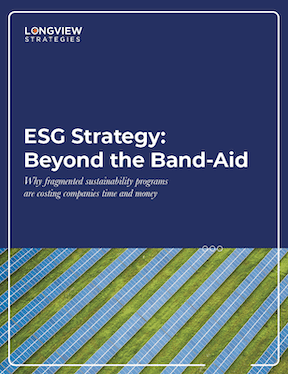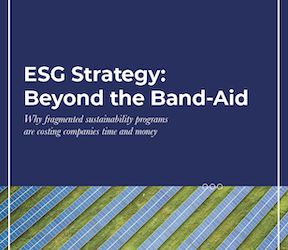Morningstar recently released research showing that most investors, regardless of age or gender, are interested in sustainable investing. This trumps previously held beliefs that the majority of interest fell to millennials and women. You can imagine our excitement at a first glance, as we clicked through to the report. But less than two paragraphs in we noticed something that quickly took the wind out of our sails.
While the research does indeed show, convincingly, that investors across varying demographics prefer sustainable investing choices, the message behind sustainable investing is still presented as accepting concessionary returns or sacrificing returns for a higher sustainability rating.

(Note: boiling down sustainable investing to nothing more than a sustainability score from an off-the-shelf product provider is insulting and as far off base as it is, but that’s a topic for another blog).
The graphics may seem like a minute detail, but as strategic communications professionals, to us, this is a big deal. This message affirms the myth that has plagued sustainable investing for decades: in order to invest sustainably, one must accept lower rates of return. This assertion runs contrary to mounting academic research and empirical evidence showing that sustainable investing can lead to outperformance.
Just as there are differences between growth and value investing, for example, there are differences in the application of sustainable investing – primarily ESG, SRI, and Impact. To learn more about these different practices, please visit our Sustainability page.
Can the traditional practice of exclusionary screening in Socially Responsible Investing (SRI) limit the investment universe and ultimately negatively impact performance? Yes. Does Impact Investing (in most cases) place a greater emphasis on positive social and environmental impact than financial return? Yes. Does the proper integration of ESG negatively affect returns? Absolutely not. In fact, quite the opposite.
In November, we supported CFA Society Boston with its annual Sustainable Investing Seminar, part of the Institute’s larger sustainable investing initiative. Needless to say, it was an incredible opportunity, particularly as CFA Institute released its position statement on Environmental, Social, and Governance integration in January. A few excerpts:
- CFA Institute Standards of Professional Conduct require CFA® charterholders to conduct appropriate research and investigation of all material information relevant to their investment analyses and portfolio management decisions, recommendations, or actions.
- CFA Institute believes this requirement includes the consideration of material ESG information/considerations (ESG factoring) as an important component of a complete and thorough financial analysis for any actively managed fundamental investment portfolio.
- More broadly, CFA Institute encourages all investment professionals to consider ESG factors, where relevant, as an important part of the analytical and investment decision-making process, regardless of investment style, asset class, or investment approach.
- ESG factoring is consistent with a manager’s fiduciary duty to consider all relevant information and material risks in investment analysis and decision making.
In the event the above isn’t clear, ESG is about considering material non-financial information. What do we mean by material? Any factors that are reasonably likely to impact the financial condition or operating performance of a company and therefore are most important to investors. Consideration of these factors in investment decision-making should not really come as a surprise to, well, any investor. As far back as 2005 Ocean Tomo found that 80% of S&P 500 market value resided in intangible or non-financial assets. In 2017, that number rose to 84%.

Given this fact, it’s not surprising that according to a November 2018 study by Ernst & Young, 97% of institutional investors surveyed consider non-financial disclosures. Additionally, as part of our work with CFA Society Boston, we had the opportunity to sit down and conduct interviews regarding ESG and sustainable investing with some notable investors from top institutions, including Grantham, Mayo and Van Otterloo (GMO), State Street, and Bank of America.
(To view these interviews and others from the Seminar, please visit CFA Society Boston’s Sustainable Investing Videos page.)
The consensus among these leading investment figures? Sustainable investing, whether SRI or impact investing, meets the needs of what investors want. And, when done properly through the appropriate integration of ESG, it’s simply good investing.




